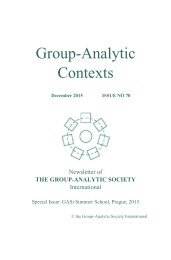Group-Analytic Contexts, Issue 80, June 2018
You also want an ePaper? Increase the reach of your titles
YUMPU automatically turns print PDFs into web optimized ePapers that Google loves.
58 <strong>Group</strong>-<strong>Analytic</strong> Society International - <strong>Contexts</strong><br />
and they come to accept modest expectations and not to act in a<br />
depressive way. They do not wait but try – as the Stones say. By the<br />
way, self-efficacy is an important issue in every treatment whether<br />
individual or group.<br />
Case report: The following case report shows that group therapy<br />
added to individual psychoanalytic treatment. Two individual sessions<br />
and one group session per week. It is an example of concurrent<br />
therapy.<br />
A woman with a recurrent depressive disorder, 57 years old,<br />
working in her own company as architect. When we started treatment,<br />
she had one son with an Asperger Syndrome and a husband with<br />
pancreatic cancer. She grew up with four siblings, with a mother who<br />
never wanted children at all, a father who drunk and acted violently,<br />
sometimes with nothing to eat, sometimes with no heating in winter.<br />
“I am a bad human” is her certainty. Her only authorization is to live<br />
to be useful and capable and work hard. The main issues in the<br />
individual treatment were superego and shame problems. She came<br />
three times a week to individual therapy and after one year we decided<br />
to replace the third session by participation the Tuesday evening<br />
group. The increase of possibilities of transference helped her to get<br />
access to her negative transference and to work on it in both<br />
therapeutic settings. When her husband died in February this year,<br />
after three years of suffering, she was sad and in grief but in no way<br />
depressive. She had a good farewell with her husband although he<br />
died. This was a very, very great success for her.<br />
An example of her negative transference: the group discussed<br />
the importance of being on time. She was very strict during this<br />
discussion and actually had never been late. The following Tuesday<br />
evening the traffic in Cologne was as terrible as it sometimes is in the<br />
evening rush hour and she was late. She stood in front of the door and<br />
didn’t ring the bell but turned to her car and drove home. She did not<br />
dare to enter the group session late because she was frightened. We<br />
met in the individual session after this incident and decided to figure<br />
out what had happened in the next group session – feeling this<br />
belonged to the group. In the next group session, group members were<br />
astonished and shocked that she had not dared to enter the group. They<br />
were able to work out that it was not the group or the group leader that<br />
she was afraid of, but her inner objects – her parents, who both acted<br />
violently in her childhood. In the individual sessions we spoke about<br />
her extreme courtesy. After every session she very politely thanked<br />
me for the session. Her deep gratitude seemed a bit exaggerated –













